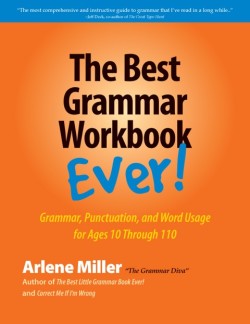
Thanks to your nifty comments (nifty? Does anyone use that word anymore?), I have one more installment of Fifty Shades of Grammar for you before we begin a new series of blog posts. And I have a special offer for you at the end of this post!
So, here we go (I hope I am not repeating myself with any of these!) . . .
1. Compose vs. Comprise – I don’t even want to go here, but someone mentioned it as a peeve. Is there anyone who uses these correctly? OK. Here is the story as I know it: Compose means “to make up or form something.” Often we use it as “is composed of.” The United States is composed of fifty states.” Then, we take it a step further and attempt to use comprise, and we say “The United States is comprised of fifty states.” This actually is not incorrect and is a third or fourth definition of comprise. However, if you want to use comprise in the sentence, this is really the preferred usage: “The United States comprises fifty states.” Therefore, is composed of is synonymous with comprises.
2. Criteria and Data – These words are both plural, criterion and datum being the singular forms. So when you say “The criteria is . . .” that is incorrect. It is either “The criterion is” or “The criteria are.” However, data is different. We don’t generally use datum . . .what is one piece of datum? So data is commonly used as a singular no matter what: “The data shows that . . .”(singular)
3. Continually vs. Continuously – These two words are actually different, although most people don’t make the distinction. Continuously means “without stopping.” Continually means “happening over and over again for a long time,” but not actually without stopping. Here is an example: “It has been snowing continuously since yesterday morning.” It hasn’t stopped snowing at all. “This winter we have had continual snowstorms.” It has snowed repeatedly, but it has stopped in between.
4. Punctuation outside the quotes – This bothers many people. However, in British English, the rules are the exact opposite of ours. Here are the American English standards for using other punctuation with quotations marks:
- Periods and commas always go inside quotation marks. Always.
- Colons and semicolons always go outside quotation marks. Always.
- Question marks and exclamation marks can go either inside or outside depending on the sentence. If the question mark or exclamation mark belongs to just the quoted portion of the sentence, it goes inside. If the entire sentence is a question or exclamation, the mark goes outside the quotes. If both the question and the entire sentence are questions or exclamations, use one mark only and put it inside.
5. Say vs. Tell – I don’t know where in the country these are used “incorrectly,” but there is definitely a distinction between these two words even though they both involve talking! Telling usually involves another person. So, there is often an indirect object in the sentence: Tell me that secret. Tell her a story. You wouldn’t “say her a story.” “Said” is often used in dialog: She said, “. . . .” or if not, it generally has a direct object, but no indirect. It’s kind of a weird distinction that must be very difficult for anyone trying to learn English! “I told her a secret.” But “I said that to her.” But then, you could also say, “I told that to her . . .” Go figure.
6. Try and – The correct phrase is try to, not try and: “I will try to make it to your party.”
7. Inflated verbiage – This was a common peeve. Using big words when small ones will do (and often using them incorrectly or making them up entirely); using ten words when three would be better. You get the point. Some examples of inflated verbiage:
- Using words like enormity and orientate
- Using phrases like “What I did is . . . ” or “What this means is . . . ” or “The reason is because . . .”
- Or phrases like “The fact that . . .” or “That being said . . .”
8. Whether vs. weather – And while we are talking about the weather: climactic vs. climatic. The one that means “sunny” or “cloudy” is weather. And global warming is a climatic topic. Climactic with the additional C is related to the word climax: “The climactic moment of the movie is . . . ”
9. With regards to – There is only one regard: “With regard to” is correct.
10. I should of went – Double whammy here: It is should have, not should of. And it is gone, not went: I should have gone.
11. Nouns used as verbs – Many of us don’t like this trend:
- Since I don’t need this for myself, I will gift it. (Last time I looked, gift was a noun)
- Let’s common core this lesson plan. (Let’s not.)
12. Overuse of trendy words – And we all do have our favorite words! Right now amazing seems to be overused by many people. I have known people who favored the overuse of basically and remarkable as well.
13. Weird road signs – A little punctuation might help. Here are a few:
- Prepare to stop federal offices
- Semi exceeding the speed limit prohibited
- Slow deer crossing
14. “Well, here’s the thing” – What thing?
Special Offer!!!! – I believe I promised you a special offer, so . . .
My new book, The Best Grammar Workbook Ever!, is just about to be hot off the presses. I am offering a free PDF copy (all 207 pages) to the first 20 people who e-mail me at bigwords101@yahoo.com. This is the final copy, not a draft.
Of course, there is a catch! In return for the book, you have to promise to write a nice (5 stars?) review for the book on Amazon. It doesn’t have to be long. And since the book is a reference, you don’t even have to read it cover to cover. Since the book is not yet on Amazon, I will let you know when to post the review.
Deal?
Also: For you locals –
Saturday, March 28 from 10:30-3 at the main Sonoma County Library on E Street in Santa Rosa is the Local Authors Symposium. Many local writers will be there displaying (and selling) their books and talking to you. I am among them! I believe I speak at 1 p.m.
Friday, May 15 at 7 p.m. is the launch event for The Best Grammar Book Ever at the Petaluma Copperfield’s bookstore.
I might even be at the Solano County Book Festival in April….Will let you know next week!



New Subject: the dreaded dash.
I know you did not cover the use of the dash (“en” dash “em” dash, “Emm” dash, ad infinitum). My understanding is that dashes come in pairs. The Chicago Manual of Style disagrees with me, but softly. It says the “en” dash MAY be used in place of a colon, semi-colon, or comma.
And now I see established writers doing exactly that — using it like a different punctuation mark.
Do you have any strong feelings about the colon (punctuation mark, not a part of the human anatomy)?
See you on Saturday!
Tim
The em dash (long dash) comes in pairs if you are setting off something in the middle of the sentence. You could just have one, though, if it is something at the end of the sentence you are setting off. The en dash, as far as I know, is used for ranges of numbers and minus signs. I don’t see anything about en en dash replacing a colon, semicolon, or comma. What you see people using is probably an em dash, in their minds, although not on their keyboards. I can make both kinds of dashes on my Mac. Colons are nice: they introduce lists, both vertical and horizontal, theory are used in digital time, and they are used in the salutation of business letters. They can also be used to introduce a lengthy quotation or to connect two sentences if the second sentence follows or explains the first! Colons are completely different from semicolons and never interchangeable.
Thanks, especially, for the inside-or-outside the quotes clarification.
You’re welcome!
Can’t help myself when I see the phrase “American English”, but to think of oxymoron and the old standby joke of ‘military intelligence’ There still exist people out there who think American is not just a person, but a LANGUAGE, too!
Kim P.
I think the phrase is mostly used to distinguish American usage from British usage….although I am sure there are people who think American is a language!
How about “Give my regards to the family”?
Makes sense to me. Or Broadway????
My early grammar teacher also said never use “Whether” because it creates complicated sentences that confuse or obfuscate. She said there is only one kind of weather, and it is outside.
My early grammar teacher said never use “wich”, as in “Wich is”. She said there is only one kind of wich, and she wears a black pointy hat.
Re #12: Overuse of trendy words – For me, it is “awesome.” It is awesome how tired I am of that word!
I am guilty of the overuse of “awesome.” I am trying to cut down!
Your honesty is awesome, Arlene. 🙂
Awesome of you to say that, Diane!